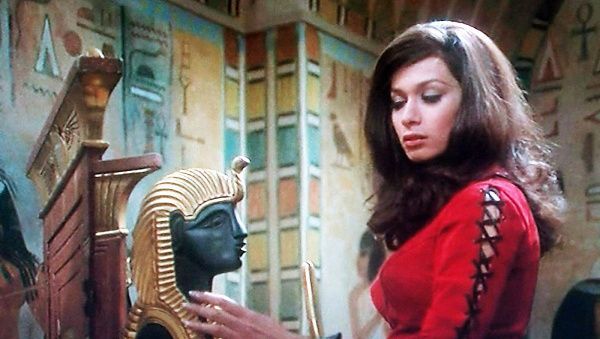Eye For Film >> Movies >> Blood From The Mummy's Tomb (1971) Film Review

Over the course of his life, Bram Stoker wrote 12 short novels. Everybody knows Dracula but the others have faded into obscurity, in many cases mercifully so. The Jewel Of The Seven Stars, which would later inspire Rachel Weisz's character in the Mummy films, was picked up by Hammer in the Seventies and heavily restructured as it made the transition to the screen. The result is a film that has the full-on grand guignol atmosphere at which Stoker excelled, with ancient artefacts and terrible curses and gushing blood, but which manages to hang together as a story much better than it did on the page.
Key to its success is Valerie Leon in the meatiest role of her career. She plays Margaret, the headstrong but good natured daughter of Andrew Keir's aging Egyptologist. She also plays Tera, an Egyptian Queen killed many centuries ago but never quite robbed of her power. Tera wants to be reborn and Margaret has been marked from birth as her chosen vessel. But this isn't the usual tale of a virginal innocent terrorised by a destructive demon. Margaret, increasingly dominated by the dead Queen's influence, sees it more as a merging, and is quite attracted to the idea of wielding power. As her father and her boyfriend Tod (Mark Edwards) try to save her, aided by an absurdly sinister Strangelove-style doctor (Aubrey Morris), the power-hungry Corbeck (James Villiers) is working to ensure Tera's return.

Despite the skimpy negligés and prominent cleavage, Leon delivers as much more than just eye candy. Her formidable presence is a match for any of Hammer's celebrated male leads and gives the film the personality it needs to get away with its sillier aspects - of which there are quite a few. Before the resurrection can occur, artefacts stolen from Tera's tomb need to be recovered. We're repeatedly told how valuable these must be but, well, the average joke shop could probably sell you something similar for under a fiver. The famous jewel is a large ruby ring whose seven stars can be mapped onto the heavens, Prometheus-style (though Stoker at least had the wit to realise their respective position would have moved over time). Our heroine scares people by pointing it at them threateningly. Somehow, all her slain foes end up with their throats cut, in increasingly unlikely ways.
Keir, despite getting top billing, is underused, so the drama depends on the tension between Leon's two characters. Villiers is effectively creepy, especially in voyeuristic early scenes, but suffers from being too much of a stereotype. But some scenes built on the flimsiest of premises - Edwards on a fire escape seeing the shadow of a dog, a man in a mental hospital terrorised by a snake statuette - succeed in being fantastically creepy. The action direction is much sharper than in many Hammer works and really gives this an edge.
Sadly, Dracula is all many people think of when they think of Hammer, and though those films are impressive, they're far from being the studio's only interesting work. Blood From The Mummy's Tomb may at times be incoherent but it's great fun, with an ending that is both neatly referential and darker than anything this camp has a right to be.
Reviewed on: 08 Sep 2012


















